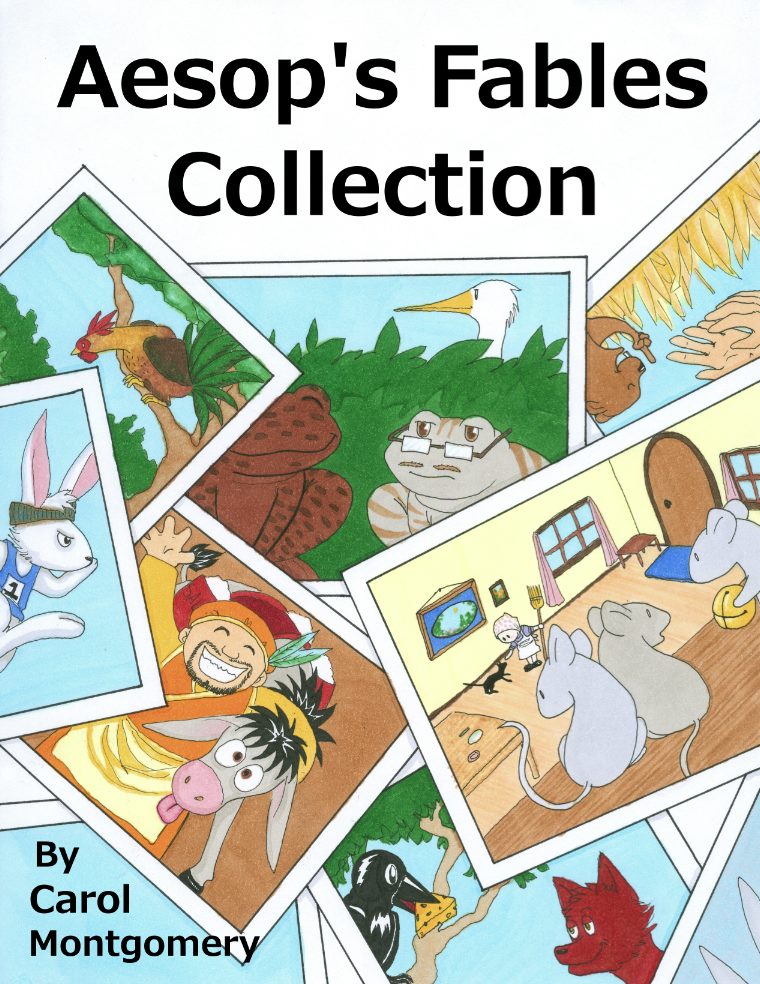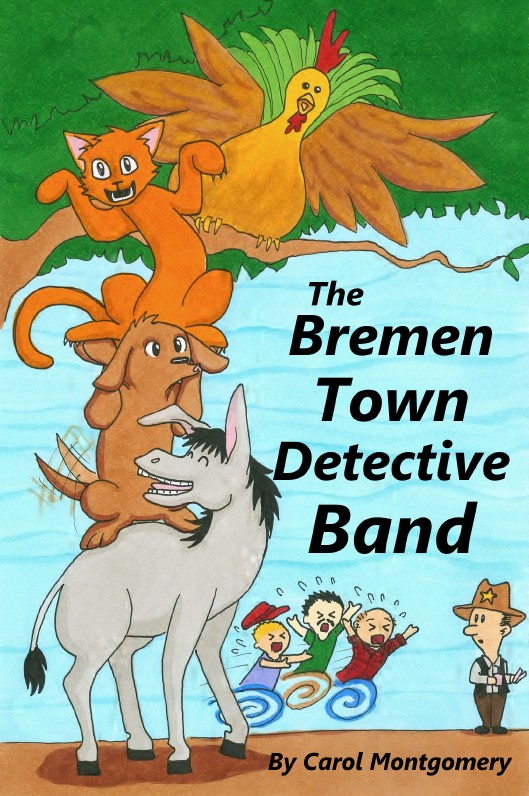 So, you just learned about Readers Theater and how wonderful it is for building life-long skills in your students. You've heard how Readers Theater can accelerate learning while improving fluency and comprehension. You're ready to dive in and choose a few scripts. What do you do now?
So, you just learned about Readers Theater and how wonderful it is for building life-long skills in your students. You've heard how Readers Theater can accelerate learning while improving fluency and comprehension. You're ready to dive in and choose a few scripts. What do you do now?
"How to Choose a Readers Theater Script for Your Homeschool" will help you with clear answers to three basic questions:
1. Why choose Readers Theater?
2. How do you choose scripts that are right for your students?
3. What do you do next?
1. Why choose Readers Theater?
Readers Theater is easy, fun, and helps build life-long skills for success. If you haven't read our article "5 Reasons Why Readers Theater Helps Homeschoolers Succeed" yet, then you'll want to check that out. Besides the five basic skills listed in the article (i.e., reading , writing, listening, thinking, and speaking), Readers Theater has over 52 benefits.
As a classroom teacher I didn't recognize all the benefits of Readers Theater. But, studies and teacher feedback demonstrate the power of Readers Theater to help students. Our article "Readers Theater Prepares Future Leaders" includes the amazing story of a teacher who saw dramatic results from using Readers Theater in her classroom regularly.
I love this quote from a Jo Worthy, Ph.D.–teacher, college professor, and mother:
"In my years as an elementary and middle school teacher, a professor of reading methods in a teacher preparation program, and the mother of a resistant reader (Worthy, 1998), the single most motivating activity I have ever found is Readers Theater. When I work with school faculties on professional development, I present a wide range of instructional activities, and teachers are interested in many of them. But, without fail, Readers Theater is the approach that captivates everyone."
(From her book, Readers Theater for Building Fluency–Strategies and Scripts for Making the Most of This Highly Effective, Motivating, and Research-Based Approach to Oral Reading © 2005 p.9.)
2. How do you choose scripts that are right for your students?
In order to choose appropriate scripts for your students you'll have to answer some basic questions (listed below):
• Who are your readers?
I've enjoyed Readers Theater with a classroom full of students, a family visiting for an evening, a drama club filled with homeschoolers, and even our own family holiday gathering with friends. Ask yourself a few questions...
What are the ages of those who will be reading? Are there any non-readers that could be part of an echo or chorus? Will the students be reading with Grandma on the phone or Skype?
How many readers will be included? Maybe you'll have two, three, or four small groups and do more than one script with people taking turns being part of the audience.
What is the approximate reading level of the readers? Just because a student is in a particular grade doesn't mean that he or she will read at that grade level. When I was in the classroom as a fourth-grade teacher I had students that read on a middle school level and I had a dyslexic student who read on a second grade level. In the past, newspapers were written on about a seventh grade readability level. Now the readability of media varies based on the targeted readers.
Choose Readers Theater scripts for the approximate readability level of most of your readers. Some parts will be easier than others. For example, usually the narrators parts are more difficult, but it always depends on the script.
If you have young readers go over any new vocabulary ahead of time with them. If you have beginning readers choose an easy script. Your goal is fluency, comprehension, and fun.
Remember, readers MAY read more than one part. And, it's a lot more fun if you give students an opportunity to read different parts. Encourage them to experiment with different voices when appropriate.
• What topic do you want?
Humorous scripts make popular Readers Theater scripts. But, maybe you'll be doing a unit study on a particular topic or person, so you'll choose a few scripts on that topic or person (e.g., the digestive system, the Moon, Harriet Tubman, Benjamin Franklin, the Iditarod and the Great Race of Mercy...). Or, maybe you just want to make a section of literature come alive with a Readers Theater script (e.g., Aesop's Fables, children's literature, the Bible...)?
Once you decide on the topic or genre find a script with the proper tone, cast number, and readability level. You may find scripts in books and online, or you may write your own.
• Where will you rehearse and perform?
When we did holiday family Readers Theater with friends sometimes we all just sat in a circle in the living room to rehearse. We had no official performance, but we still had fun!
When we had one family over to our house to celebrate a holiday we used costumes for our small children and "performed" in the living room. Parents were part of the cast. We had no audience besides ourselves.
When we had a homeschool drama club rehearsing at our house we had about thirty students in a large family room. If we needed to practice several Readers Theater scripts at the same time the students were divided into four groups. Each group rehearsed in a different corner or part of the house–even the kitchen! The performance was scheduled on stage with microphones at a local church.
I've heard of Readers Theater being "performed" at family gatherings, picnics, and special cottage classes with just a few families. Of course, if you do Readers Theater on the phone with Grandma you may not have an "official" performance, but you will have guaranteed fun!
• When will you rehearse and perform?
Some teachers enjoy Readers Theater every day with a center activity for a small group of students. Students will make the most progress with regular Readers Theater practice. But, when we had the homeschool drama club we rehearsed just once a week for several weeks before the dress rehearsal and the main performance.
In a homeschool you have great flexibility with your schedule. You may even have a rehearsal and a performance the same day; however, some of the benefits of Readers Theater comes with repeated readings to build fluency, comprehension, and creative interpretation. Choose rehearsal and performance times that work best for you and any homeschoolers who will enjoy Readers Theater with you.
• How will your students perform your Readers Theater script?
You have unlimited opportunities to perform Readers Theater from small family performances for stuffed animals or pets to visiting nursing homes or senior centers. You already know that you may open your home or yard to an informal Readers Theater performance. There's only one potential challenge: readers must be heard. It's difficult to follow a story if you can't hear all the words, so teach your students to project their voices for a potential grandma or grandpa who may be listening someday.
You can get around the projection issue some if you have access to one or more microphones or if you prerecord the voices (e.g., for a puppet show, podcast, or paper slide show). Yet, students will still need to project their voices and enunciate clearly (e.g., not too fast).
3. What do you do next?
When I was teaching school there were no computers and no internet. I only had a few scripts that I found appropriate so I wrote some for my master's project on Readers Theater. Although I ordered some script books I constantly found them full of scripts that I didn't like or would never use. What I really wanted was a source of trustworthy scripts at a reasonable price.
You may find plays and scripts at your local library, in books, and online; however, the quality varies. Some aren't printable unless you retype them. And, you may read several before you find one that suits your needs or that you even like.
I remember reading a Readers Theater script from a children's author about a little girl who kept whining to get her way with her mom. Mom kept saying, "No." The girl kept whining for what she wanted.
Finally, Mom had enough of the whining, gave in to the little girl and answered, "Yes." I was horrified. The little girl was rewarded for having a bad attitude and whining.
Maybe the author thought that it was a funny story. But, as a teacher and mother I knew we could do better by investing in positive character-building scripts. Please, choose trustworthy scripts that will help your children build positive character and life-long skills.
You'll find lots of scripts online at no charge. You may also invest in your children's future success by partnering with us in the Script Buffet Club. I've created a growing library of trustworthy scripts to help teachers like you have more fun while you get the job done. The next step is up to you. Won't you join us in building leaders and creators with Readers Theater?





 So, you just learned about Readers Theater and how wonderful it is for building life-long skills in your students. You've heard how Readers Theater can accelerate learning while improving fluency and comprehension. You're ready to dive in and choose a few scripts. What do you do now?
So, you just learned about Readers Theater and how wonderful it is for building life-long skills in your students. You've heard how Readers Theater can accelerate learning while improving fluency and comprehension. You're ready to dive in and choose a few scripts. What do you do now?



.jpg)

